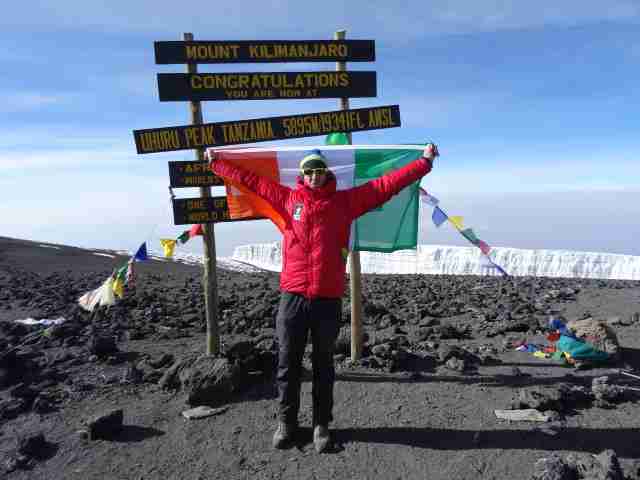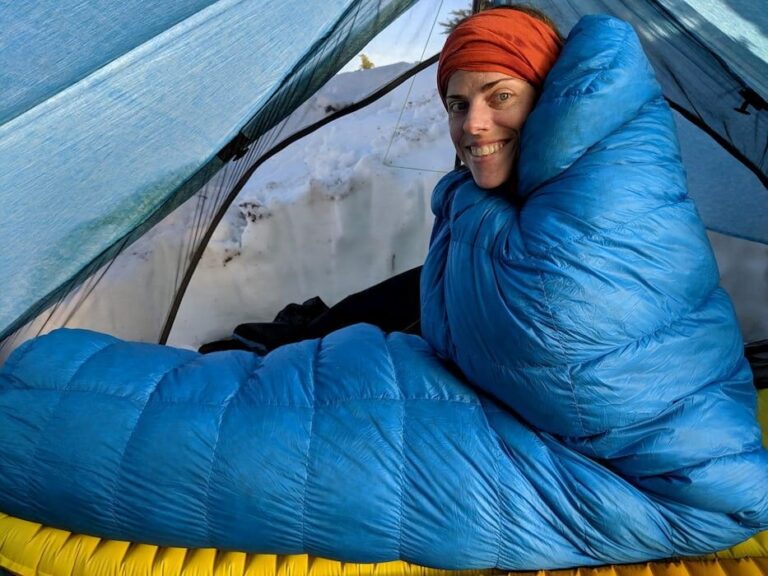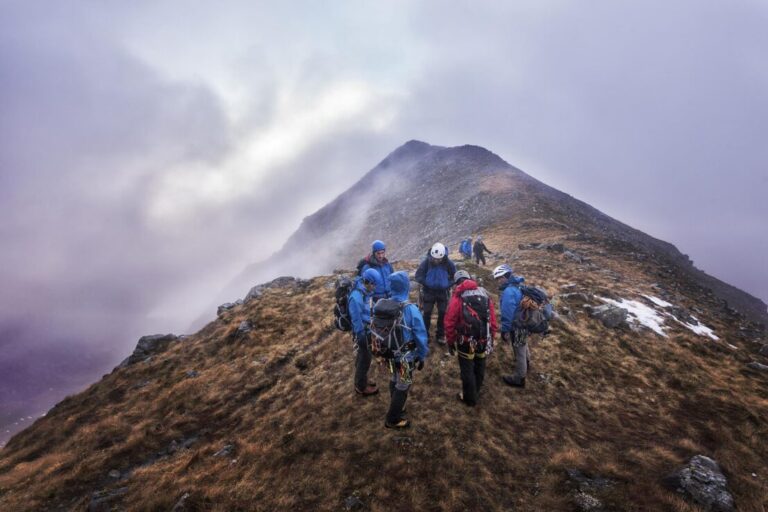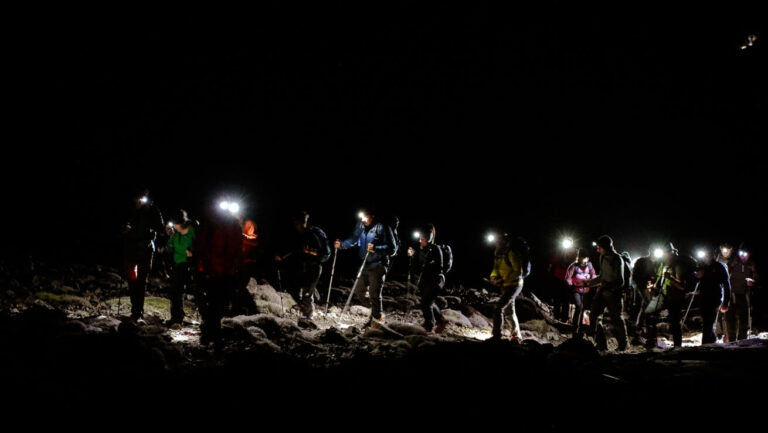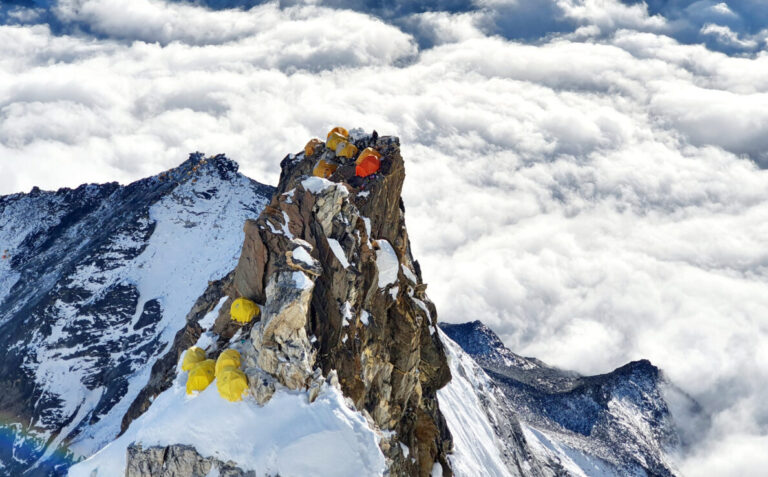Kilimanjaro Climbing Gear List
Located in northern Tanzania, Kilimanjaro stands majestically at 19,340 feet, making it the tallest mountain in Africa and one of the Seven Summits of the world.
The huge, snow-capped volcano rises dramatically above the vast African plains. Climbing Kilimanjaro and watching the sun rise across the savannah below is an experience and personal accomplishment you’ll carry with you for the rest of your life.
To climb Kilimanjaro, you must be in excellent physical shape and equipped with the right gear for traveling and trekking. Before traveling to Tanzania, make sure you’re up to date on routine vaccines and talk to your doctor about other vaccines and medicines you may need.
Kilimanjaro Weather
While climbing Kilimanjaro you will cross through several different ecological zones from lush rainforest to the alpine desert to the cold and beautiful arctic zone on the summit. The temperature at the base of the mountain can be 70–80°F, while on the summit it can be -20–20°F. Be prepared for the changing weather by carrying the appropriate clothing layers.
Best time to go: There are two main seasons for climbing Kilimanjaro: December–March and June–October. December–March can be cold, especially on the summit, but the mountain is generally less busy than during the more popular June–October time period.
Kilimanjaro Guides and Fees
To climb Kilimanjaro, you must hire a registered guide. You can arrange your climb with a guide company in Tanzania or go with one of many guide companies in the U.S. Most reputable guiding outfits charge €3,000–€4,000 to climb Kilimanjaro, depending on the route, length of trip, and quality of accommodations. (Many guide companies offer the option of adding on a safari trip after your climb).
In addition to a qualified guide, the guide company generally includes porters, meals, and group gear (e.g., tents, sleeping pads, cooking gear, and treated drinking water).
The guide fee also typically includes the fees to enter Kilimanjaro National Park.
Tipping guidelines: Gratuities too guides and climbing support staff are not included, so bring cash if you’d like to offer a tip. Tipping is voluntary and you can do so at your own discretion, but as a general guideline, plan on about $250 ($100 to the head guide, $50 total to assistant guides, $50 total to cooks, and $50 total to porters.)
Kilimanjaro Routes
There are seven primary routes up Kilimanjaro. None of them require technical climbing, but they all demand that you are in excellent shape and have a strong will to keep hiking over rugged terrain.
Whichever route you take, it’s important to move slowly up the mountain to avoid altitude sickness. It’s common for climbing teams to take 5–8 days to get to the summit and back.
Three of the most popular routes on Kilimanjaro are the Machame Route, the Marangue Route, and the Lemosho Route.
Machame Route: The Machame Route approaches from the south and offers excellent views as you travel through Kilimanjaro’s various ecological zones. The Machame is steeper than some other routes, so it is best for determined trekkers. You’ll camp in tents along the way. An ascent via the Machame Route typically takes 6–7 days.
Marangu Route: The Marangu Route approaches from the southeast and travels through the bamboo rainforest, alpine heather, and “the Saddle” with its stunning views of the Kibo and Mawnzi volcanic cones. You’ll stay in wood and stone mountain huts along the way. The Marangu Route typically takes 6 days.
Rongai Route: The Rongai Route approaches from the north. This climb is regarded as a quieter, wider way to the peak. It eventually merges with the Marangu route at the Kibo hut and offers a more gradual slope perfect for those with less backpacking experience. The Rongai Route is typically climbed for 7 days.
Lemosho Route: The Lemosho Route is considered to be one of the most scenic routes on Kilimanjaro, and its long path allows ample time for acclimatization. You’ll start in the lush rainforest on the western side and eventually traverse the Shira Plateau and the Southern Circuit, taking in views of the Kibo volcanic cone and its incredible glaciers. You’ll camp in tents as you make your way up the mountain. The Lemosho Route is typically climbed in 7–8 days.
Packing for Kilimanjaro
Climbing Kilimanjaro involves a combination of international travel and backpacking. Depending on where you live, you’ll most likely have one or two days of travel to reach Tanzania.
To pack for this, it’s helpful to keep your climbing clothing and gear apart from your travel clothing and gear by packing in separate duffel bags or pieces of luggage. Before you set out on your climb, you’ll be able to leave your non-climbing clothing, gear, and toiletries behind at a hotel or guide company office.
While climbing Kilimanjaro, you will typically carry the gear you need for trekking from one camp to the next in a medium-sized daypack (approximately 25–35 liters). You’ll pack things like sunscreen, sunglasses, food, water, money, a passport, a camera, and extra clothing in this bag.
The rest of your clothing and gear goes in a large duffel bag that will be carried by a porter from camp to camp. Guide companies typically require that your duffel bag with gear weighs no more than 33 lbs. (15kg).
When buying a duffel bag for this purpose, look for one with about a 95-liter capacity. The duffel should be made from rugged waterproof material and have a durable zipper that can be locked and closed with a luggage lock. Pack your clothing and gear in large garbage bags before stashing them in the duffel to ensure everything stays dry.
Kilimanjaro Packing Climbing Gear List
The following climbing gear list is designed for a guided trip to Kilimanjaro. Guide companies will generally include group cooking equipment, tents, sleeping pads, and water filters. Check with your guide company ahead of time to be sure you understand what gear is provided.
The equipment on the climbing gear list, combined with the tools provided by your guides, will cover the Ten Essential Systems you should have on every backcountry trip:
- Navigation.
- Sun protection.
- Insulation.
- Illumination.
- First-aid supplies.
- Fire.
- Repair kit and tools.
- Nutrition.
- Hydration.
- Emergency shelter.
Note: There may be an overlap with equipment for travel and equipment for climbing. Keep this in mind when choosing quantities.
Travel Documents
- Airline tickets (confirmation and itinerary)
- International health card (immunisations listed)
- Passport photos (2)
- Valid passport
Travel Clothing
- Wicking, quick-dry boxers or briefs
- Wicking, quick-dry sports bra (for women)
- Synthetic or wool T-shirt
- Long-sleeve, travel-friendly shirt
- Lightweight, travel-friendly pants
- Bathing suit (optional; for hotel pools)
- Casual shoes
- Midweight wool or synthetic socks
Climbing Equipment
- Day pack (25–35 liters)
- Sleeping bag comfortable to 15°F (dependent upon season, weather forecast and personal preference)
- Waterproof hiking boots
- LED headlamp with extra batteries
- Trekking poles
- Heavy-duty duffel bag (95 liters; no wheels or rigid handles)
Climbing Clothing
- Wicking, quick-dry boxers or briefs (3)
- Wicking, quick-dry sports bra (for women)
- Heavyweight long underwear bottoms
- Heavyweight long underwear top
- Midweight long underwear bottoms
- Midweight long underwear top
- Synthetic T-shirt
- Midweight fleece or soft-shell jacket (2)
- Midweight down or synthetic parka with hood
- Convertible hiking pants
- Fleece pants
- Lightweight waterproof/breathable rain jacket
- Lightweight waterproof/breathable rain pants
- Midweight fleece gloves or wool gloves
- Midweight waterproof gloves or mittens
- Liner gloves
- Midweight fleece/wool winter hat
- Sun-shielding hat or cap
- Midweight wool or synthetic socks (3 pairs)
- Liner socks (optional)
- Glacier sunglasses
- Neck gaiter, balaclava, Buff or bandana
- Gaiters
Personal Items
Many of the following items are optional; tailor the list to suit your personal needs:
- Water bottles (four 1-liter or two 1-liter + hydration reservoirs)
- Hydration reservoir (2-liter; optional)
- Water bottle insulating sleeves
- Watch with alarm
- Action camera (or regular camera)
- Spare camera battery
- Spare camera memory card
- Camping pillow
- Camp towel
- Insect repellent
- Pocket knife or multi-tool
- Personal first-aid kit
- Eye shade
- Ear plugs
- Hand and toe warmers
- Journal
- Pen
- Book
- Small binoculars
- Cash/credit card
- Cell phone in a waterproof case
- Large garbage bags to keep items dry (5; optional; white recommended)
Toiletries
Many of the following items are optional and specific to travel; tailor the list to suit your personal needs:
- Toothbrush (travel size)
- Toothpaste (travel size)
- Toilet paper
- Personal wipes
- Women’s hygiene items
- Pee bottle
- Hand sanitizer
- Sunscreen (SPF 30 or higher)
- Lip balm (SPF 30 or higher)
- Shampoo and conditioner
- Biodegradable soap
- Deodorant
- Dental floss
- Razor and shaving cream
- Skin lotion
- Spare eyeglasses or contact lenses
- Prescription medications; medications for traveler’s diarrhoea, altitude sickness, malaria
Food
Guide companies generally provide breakfast, lunch, dinner, and drinking water during your climb. You’ll want to add to this by bringing snacks, drink mixes, and energy foods. Check with your guide company to see what food is provided.
- Energy bars
- Energy gels
- Electrolyte replacement drink mix
Snacks (cookies, GORP, Snickers, etc.) For more info on how to, what to, and when to do, then visit: www.jasonblack.ie

